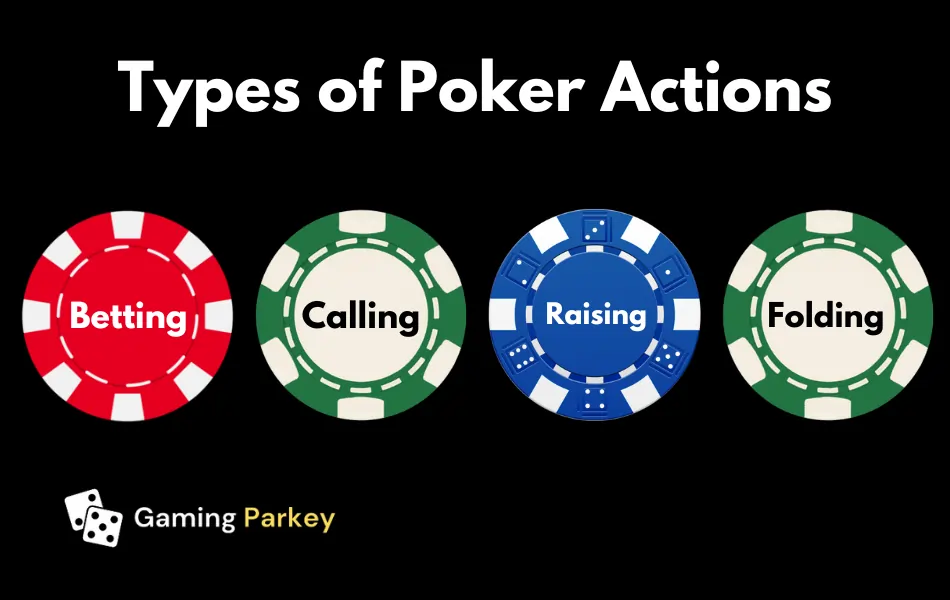
In the world of poker, understanding and mastering action is essential to becoming a successful player. Action refers to the choices and moves made by players during a poker game, such as betting, calling, raising, and folding. It is a key element of poker strategy and can greatly influence the outcome of a hand.
The Importance of Understanding Action in Poker
To excel in poker, players must have a thorough understanding of the various actions available to them and the implications of those actions. By comprehending the significance of action, players can make informed decisions that maximize their chances of winning.
Understanding action allows players to gauge the strength of their opponents' hands based on their actions. For example, a large bet from a player may indicate a strong hand, while a small bet or a check may signify weakness. By observing and analyzing the actions of other players, skilled poker enthusiasts can gather valuable information that can be used to their advantage.
Action as a Key Element of Poker Strategy
Action is not merely a reactive element in poker; it is a proactive component that requires strategic thinking. Knowing when to bet, call, raise, or fold is crucial for optimizing one's chances of success.
Each action carries its own set of strategic implications. Betting can be used to assert dominance or extract value from opponents, while calling allows players to stay in the hand and potentially see more cards. Raising can be a powerful tool to put pressure on opponents and force them to make difficult decisions, while folding is a strategic retreat when the odds are unfavorable.
By mastering the art of action, players can manipulate the flow of the game, deceive opponents, and create opportunities for themselves. Understanding the nuances of action in different poker variants such as Texas Hold'em, Omaha, and Seven-Card Stud is crucial for adapting strategies to the specific rules and dynamics of each game. To learn more about the different poker variants, check out our article on how to play poker.
To truly excel in poker, players must also be aware of the factors that influence action choices. These factors include hand strength, position at the table, and the ability to read opponents through their tells. By taking these factors into account, players can make more informed decisions and increase their chances of success.
To improve your action game, it is beneficial to observe and analyze the actions of professional players. This can provide valuable insights into their strategies and help you refine your own decision-making process. Additionally, practicing decision-making in different action scenarios can enhance your ability to analyze and respond to various poker situations. For more information on the rules of poker, including poker table rules, visit our article on poker table rules.
Mastering action in poker is an ongoing process that requires experience, skill, and a deep understanding of the game. By recognizing the importance of understanding action and incorporating it into your overall poker strategy, you can elevate your gameplay and increase your chances of success at the poker table.
Types of Action in Poker
In the world of poker, understanding the various types of actions that players can take is essential for strategic gameplay. Actions such as betting, calling, raising, and folding play a crucial role in shaping the outcome of a poker hand.

Betting
Betting is the act of placing a wager on the poker table. It is the first action taken after receiving the initial cards, known as the hole cards. The player initiating the betting round is the one sitting to the left of the dealer, and the subsequent players have the option to call, raise, or fold based on the amount of the initial bet.
Calling
Calling refers to matching the current bet made by another player. By calling, a player indicates their interest in continuing the hand and staying in the game. It allows the player to remain competitive and see the next community cards without increasing the wager. The decision to call is based on factors such as hand strength, position at the table, and the player's read of their opponents.
Raising
Raising involves increasing the current bet made by another player. When a player raises, they are signaling their confidence in their hand and their desire to increase the pot's size. This action puts pressure on the other players, forcing them to decide whether to call the raised bet, raise it further, or fold. Raising can be a strategic move to assert dominance or to bluff opponents into thinking the player has a strong hand.
Folding
Folding is the decision to forfeit the current hand and discard the hole cards. When a player folds, they remove themselves from the current betting round and any potential winnings. This action is typically taken when a player believes their hand is weak or unlikely to improve with the community cards. Folding allows players to conserve their chips and wait for a better opportunity to play a stronger hand.
Understanding the different types of poker actions is crucial for making informed decisions at the poker table. Each action carries its own strategic implications and can significantly impact the outcome of a hand. To learn more about the fundamentals of poker, visit our articles on what is poker? and how to play poker?. If you're interested in learning specifically about Texas Hold'em, check out our guide on how to play Texas Hold'em. Familiarizing yourself with the actions and their nuances will help you refine your poker skills and play like a pro.
Factors Influencing Action Choices in Poker
When it comes to making decisions in poker, several factors come into play. Understanding these factors is crucial for making informed choices and maximizing your chances of success. The key factors that influence action choices in poker are hand strength, position at the table, and player reads and tells.
Hand Strength
The strength of your hand is one of the primary factors that dictate your actions in poker. A strong hand with a high probability of winning will often lead to more aggressive actions such as betting and raising. Conversely, a weak hand may prompt you to take more defensive actions like calling or folding.
It's important to note that hand strength is not solely determined by the individual cards you hold, but also by their potential to improve as the community cards are revealed. Experienced players analyze their hand strength relative to the potential winning combinations and assess the likelihood of improving their hand throughout the course of the game.
Position at the Table
Your position at the poker table plays a significant role in the actions you choose to take. Players in earlier positions, who act before others, have less information about their opponents' hands and must act cautiously. In contrast, players in later positions have the advantage of observing the actions of others before making their decisions.
Being in a late position provides more opportunities for strategic actions such as betting and raising. It allows players to gain valuable insights into their opponents' intentions and adjust their own actions accordingly. In contrast, players in early positions should exercise caution and carefully consider the strength of their hand before committing to any action.
Player Reads and Tells
Observing your opponents' behavior and making accurate assessments of their likely hand strength is a crucial aspect of poker. This skill, known as player reads, enables you to make better-informed decisions about your own actions. By paying attention to betting patterns, body language, and verbal cues, you can gather valuable information about the strength of your opponents' hands.
Additionally, tells are subtle physical or behavioral cues that players inadvertently reveal during gameplay. These can include actions such as betting patterns, nervous gestures, or changes in facial expressions. Recognizing and interpreting these tells can give you an edge in assessing your opponents' hands and adjusting your own actions accordingly.
By considering factors such as hand strength, position at the table, and player reads and tells, you can make more strategic decisions in poker. Understanding how these factors interplay will allow you to adapt your actions to the specific circumstances of each hand. To further enhance your poker skills, we recommend observing and analyzing the actions of professional players and practicing decision-making in different action scenarios. For more information on poker and its rules, check out our articles on what is poker? and how to play poker?.
Action in Different Poker Variants
In the world of poker, different variants offer unique gameplay experiences and strategic opportunities. Understanding the nuances of action in various poker variants is essential for players looking to excel in different formats. Let's explore the action in three popular poker variants: Texas Hold'em, Omaha, and Seven-Card Stud.
Texas Hold'em
Texas Hold'em is perhaps the most widely recognized and played poker variant. In this game, each player is dealt two private cards, followed by a round of betting. Then, the dealer reveals five community cards placed in the middle of the table. Players form their best five-card hand using any combination of their private cards and the community cards.
The action in Texas Hold'em revolves around the betting rounds. Typically, there are four rounds of betting: pre-flop, flop, turn, and river. The players must make strategic decisions based on their hand strength, position at the table, and the actions of other players. To learn more about how to play Texas Hold'em, check out our article on how to play texas holdem.
Omaha
Omaha is another popular poker variant that shares similarities with Texas Hold'em. However, there is one significant difference: in Omaha, players are dealt four private cards instead of two. To form their hand, players must use exactly two of their private cards and three of the community cards.
The action in Omaha follows a similar structure to Texas Hold'em, with four rounds of betting. The additional private cards create more possibilities and potential hand combinations, making Omaha a game that requires careful consideration of hand strength and strategic decision-making. If you're new to Omaha, our article on how to play poker can provide you with a detailed overview.
Seven-Card Stud
Seven-Card Stud is an older poker variant that was once the most popular form of poker played in casinos. In Seven-Card Stud, players are dealt a combination of face-up and face-down cards over multiple betting rounds.
The action in Seven-Card Stud differs from Texas Hold'em and Omaha as players must carefully observe the exposed cards of their opponents to make informed decisions. With three face-down cards and four face-up cards, players must analyze the visible information to assess the strength of their own hand and predict the hands of their opponents. The strategic element of Seven-Card Stud lies in reading the other players at the table. To familiarize yourself with the rules of Seven-Card Stud, refer to our article on poker table rules.
Understanding the action in different poker variants is crucial for adapting your strategy and making informed decisions. Whether you prefer the excitement of Texas Hold'em, the complexity of Omaha, or the strategic reading of players in Seven-Card Stud, each variant offers unique challenges and opportunities for players to showcase their skills. Keep exploring and practicing these variants to become a well-rounded poker player.
Advanced Poker Action Techniques
To truly excel in poker, players must master advanced action techniques that go beyond the basics. These techniques involve strategic moves that can deceive opponents, manipulate the pot size, and ultimately increase their chances of winning. In this section, we will explore three crucial advanced action techniques: bluffing and semi-bluffing, slow-playing, and stealing the pot.
Bluffing and Semi Bluffing
Bluffing is a well-known technique in poker that involves making aggressive bets or raises with a weak or mediocre hand, aiming to deceive opponents into folding their stronger hands. It requires a keen understanding of player psychology and the ability to maintain a calm and composed demeanor. Bluffing can be a powerful tool when used strategically, but it should be employed selectively and with caution.
Semi-bluffing, on the other hand, combines elements of bluffing with a glimmer of hope. It involves making a substantial bet or raise with a hand that has potential to improve in later betting rounds. By semi-bluffing, players not only have a chance to win the pot immediately but also maintain the possibility of winning if their hand improves. This technique can put pressure on opponents and force them to make difficult decisions.
Table: Bluffing and Semi-bluffing in Poker
| Technique | Description |
|---|---|
| Bluffing | Making aggressive bets or raises with a weak hand to deceive opponents into folding. |
| Semi-bluffing | Making substantial bets or raises with a hand that has potential to improve in later betting rounds. |
Slow Playing
Slow-playing, also known as trapping, is a deceptive technique used to induce opponents into betting more by under-representing the strength of one's hand. Instead of making aggressive bets or raises, players with strong hands opt to check or make small bets, encouraging opponents to believe they have the upper hand. The goal is to entice opponents to bet more, thus increasing the pot size before revealing the true strength of the hand.
Slow-playing can be a high-risk, high-reward strategy that requires careful judgment and knowledge of opponents' tendencies. It is most effective when used against aggressive players who are likely to bet or bluff frequently. However, caution must be exercised to avoid giving opponents free cards that could potentially improve their hands.
Stealing the Pot
Stealing the pot is a technique employed to win a pot with a relatively weak hand by forcing opponents to fold. It involves making well-timed and aggressive bets or raises, capitalizing on the perception that opponents have weak hands. This technique is especially effective in late position or when playing against tight and cautious players.
To successfully steal the pot, players must carefully observe the actions and tendencies of their opponents. They should look for opportunities when opponents seem hesitant or show signs of weakness. By exploiting these situations, players can accumulate pots without having to rely solely on strong hands.
Mastering these advanced action techniques in poker requires experience, practice, and a deep understanding of the game. It is crucial to observe and analyze the actions of professional players to gain insights into their strategies. By practicing decision-making in different action scenarios, players can refine their skills and elevate their poker game to new heights. For more information on poker rules and strategies, check out our articles on what is poker? and how to play poker?
Improving Your Action Game
To truly excel in poker, it's essential to continuously work on improving your action game. This involves enhancing your decision-making skills and understanding how professional players approach different action scenarios. By observing and analyzing the actions of experienced players and practicing in various situations, you can elevate your poker skills to a whole new level.
Observing and Analyzing Action in Professional Players
One of the most effective ways to improve your own action game is to study the actions of professional players. By observing their gameplay, you can gain valuable insights into their strategies, decision-making processes, and the reasoning behind their actions. Watching professional poker tournaments, live streams, or recorded sessions can provide you with a wealth of information and inspiration.
When analyzing professional players' actions, pay attention to their betting patterns, timing, and bet sizing. Take note of how they adjust their actions based on their hand strength, position at the table, and the behavior of their opponents. This analysis will help you develop a better understanding of the nuances of different action choices and their impact on the game.
Practicing Decision-making in Different Action Scenarios
Improving your action game requires practice in various action scenarios. You can do this by participating in online poker games, where you can encounter a wide range of opponents and situations. By actively engaging in these games, you'll gain experience and develop your ability to make informed decisions quickly.
To enhance your decision-making skills, consider playing in different game formats and stakes. This will expose you to a variety of action scenarios, allowing you to adapt and refine your strategies accordingly. Additionally, you can utilize poker training software and tools to simulate realistic action scenarios and practice your decision-making in a controlled environment.
It's crucial to review your own gameplay after each session. Analyze the actions you took and assess whether they were optimal or if there were alternative choices that could have yielded better outcomes. By reflecting on your actions and learning from your mistakes, you can continuously refine your strategy and improve your overall game.
Remember, improving your action game in poker is an ongoing process. Keep seeking opportunities to learn, adapt, and refine your skills. By observing professional players' actions and practicing decision-making in various scenarios, you'll be well on your way to playing like a pro. For more information on poker and how to play, check out our articles on what is poker? and how to play poker?.

![How to Play Mini Baccarat? From Novice to Pro [2025 Guide]](https://gamingparkey.com/wp-content/uploads/2023/09/Discover-How-to-Play-Mini-Baccarat--450x338.webp)












